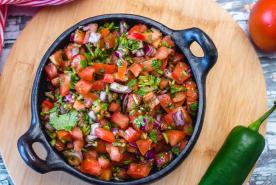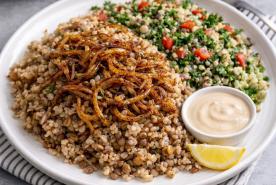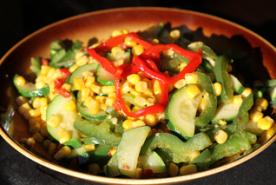Last updated: January 02, 2023
Medically reviewed by: NKF Patient Education Team
Tomatoes are rich in nutrients like lycopene, vitamin A, vitamin C, potassium, and fiber. Check with your doctor about your potassium intake, as it varies by kidney disease stage.
Tomatoes first grew in the Andes Mountains of South America. The Spanish brought tomatoes to Europe. In 1835, tomatoes came to North America. In 1893 the US supreme court ruled the tomato as legally a vegetable despite the botanical classification as a fruit.
Why are tomatoes a superfood?
- They are rich in vitamins, minerals, and antioxidants
- Tomatoes are low in calories and high in fiber; 1 cup of cherry tomatoes has 27 calories with about 1 ½ to 2 grams of fiber
- There are many varieties of tomatoes, and they are available in stores year-round. You can also grow them in your garden during the spring and summer months
- You can eat them raw or cooked: add raw tomatoes to salads or sandwiches, use cooked tomatoes as a side dish or to make tomato sauce
Tomatoes and kidney disease
The amount of potassium you can have each day will depend on your stage of kidney disease or the type of dialysis you receive (see below).
CKD/Transplant
Most people with early-stage CKD or a kidney transplant do not have to limit tomatoes because of potassium. If your laboratory results show higher levels of potassium, your doctor or kidney dietitian may talk with you about how much to eat.
Hemodialysis (3 times/week)
Potassium can be a concern depending on the amount you eat. For example, 1 or 2 slices of raw tomato has a much smaller amount of potassium than a cup of cooked tomatoes.
Daily Home and Nocturnal Hemodialysis/Peritoneal Dialysis
These types of dialysis can remove more potassium, so you may need to eat more potassium rich foods. Tomatoes are a good way to add extra potassium to your diet and decrease the need to take an additional potassium pill.
Kidney Stones
Eating tomatoes will not have an effect on forming kidney stones.
Recipes with tomatoes
Marinara Sauce
2 tsp of garlic (minced)
1 tsp dried oregano
2 pieces of bay leaves (dried)
3 cups of crushed tomatoes
1 small onion (chopped)
3 cups of tomato sauce
2 ½ Tbsps. of olive oil
½ cup of grated Parmesan cheese
¾ tsp of salt and pepper to taste
Preparation: Over medium heat, add the olive oil and the chopped onion. Cook until translucent. Add the garlic and cook for 2 minutes. Add the crushed tomatoes, tomato sauce, spices, and salt and pepper to taste. Once the sauce starts boiling, simmer at low temperature for at least one hour. After one hour, add the parmesan cheese to the sauce. Serve on top of a whole grain pasta with a side green salad. Refrigerate or freeze leftovers.
This is a low protein recipe. Add the protein from pasta for total amount of protein.
Serves 4
Nutrients per Serving:
Calories: 198
Protein: 3.75 g
Vitamin A: 1895 IU
Potassium: 920 mg
Dietary fiber: 4.4 g
Total saturated fat, cholesterol 0 (ZERO)
To reduce potassium and protein:
Instead of 3 cups of tomato sauce, use 2 cups of chopped bell peppers.
Per serving:
Calories: 166
Protein: 2 g
Potassium: 417 mg
To increase protein:
One pound of ground turkey adds 20 g of protein, 169 calories, total fat 9.4 g, saturated fat 2.6 g, and cholesterol 89.5 mg per serving.
One pound of grass-fed ground beef adds 215 calories, 21.5 g of protein, total fat 14 g, saturated fat 6 g, and cholesterol 69.5 mg per serving.
Want to save this information for later?
Download the National Kidney Foundation’s Fact Sheet: Kidney-Friendly Superfoods: Tomatoes
*This content is provided for informational use only and is not intended as medical advice or as a substitute for the medical advice of a healthcare professional.

















